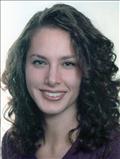
Chiara Avancini's research looks at why some people struggle with maths
My research may have wider implications in terms of opening up people’s career choices if they avoid maths-related subjects as a result of anxiety.
Chiara Avancini
What makes some people less likely to do well at maths than others? Why are women more likely to avoid STEM subjects than men? Chiara Avancini’s research aims to find out the source of maths anxiety and to test if there are ways to reduce it and boost people’s maths performance.
Chiara [2014] says the research might have wider implications in terms of opening up people’s career choices if they avoid maths-related subjects as a result of anxiety. One area of interest is gender difference. Studies have shown that girls and boys have the same ability at maths, but girls show higher levels of anxiety. This could be for cultural reasons, for instance, being socialised into thinking they are not good at maths.
Chiara is using a neurofeedback technique which records brain activity and helps patients to control their anxiety levels. If it detects muscle tension and changes in brainwaves, breathing and heart rate it will alert the patient so they can take action to calm themselves so they don’t lose focus on the maths problem they are doing.
Classics
Chiara was born in a small village in the Dolomites in northern Italy. Her mother is a clinical psychologist and her late father was a dentist. She has two siblings.
She attended her local village primary school and then went to the nearest big city for secondary school. She specialised in the Classics, but found it difficult to adapt to a larger learning environment and says she “lost motivation” and felt anxious. “It was very competitive and that is not part of my character,” she says.
It was not until she went to the University of Padua that she discovered that she preferred science to the Arts. In part inspired by her mother who was very passionate about her job, she chose to do psychology, but found she was more interested in the biological side, specifically cognitive neuroscience, than psychoanalysis. As part of her course she did a six-month Erasmus exchange in Prague.
She stayed on at the University of Padua to do her masters in psychophysiology and chose to do her thesis on numerical recognition – how people distinguish between quantities. This built on research she had done as an undergraduate, although she had not studied biomarkers for that. At masters level she recorded brainwave action. She says she became interested in numerical confidence due to her professor who she had chosen because she wanted to learn about specific techniques in neuroscience. Once she started researching the subject, however, she became fascinated.
She studied implicit and explicit maths processing, explicit being a person is directly asked to perform a maths task and implicit when they are not directly asked to do a maths task. Chiara was interested in the differences in how the numerical information was processed and in how much attention was paid in each case.
Internship
Between her masters and PhD Chiara had to do an internship – she did six months at Cambridge – where she had links because her masters supervisor at Padua had collaborated with her current supervisor, Dr Denes Szucs – and and six months in a research centre in Italy, working on a project involving magnetoencephalography to test how people process auditory information. It involves people being asked to recognise animate and inanimate objects through auditory information followed by degraded pictures.
Dr Szucs encouraged her to apply to Cambridge for her PhD. At the time she had had one journal article published and a second was awaiting publication. She had also done some voluntary work working with refugees after the 2012 crisis in Libya. She taught refugees and migrants Italian, promoted events linked to integrating refugees, fundraised and organised demonstrations about refugee rights. “I think it is important to have people to build bridges between the different communities,” she says.
All this experience contributed to her being awarded a Gates Cambridge Scholarship.
However, she was not able to start in October 2014 as planned because of a family illness. She started her course in January, but had to break off a couple of months later. That means she is only just about to start her testing.
Chiara says she hopes to continue in academic research.
*Picture credit: Wikimedia commons.

Chiara Avancini
- Alumni
- Italy
- 2014 PhD Psychology
- Newnham College
I was born and raised in a village among the beautiful Dolomiti Mountains near the city of Trento, but I studied at the University of Padova where I obtained a BA in Psychology and an MA in Clinical Psychology. During my studies, I developed an interest in difficulties experienced during schooling and in the electrophysiology of mathematical cognition. My PhD research at the Centre for Neuroscience in Education will be at the confluence of these two interests. I will study the characteristics of the physiological reactions of students experiencing high anxiety in relation to mathematics. In particular, I will focus on gender differences and I will assess whether biofeedback techniques can be used to overcome such a difficulty. At university I taught Italian to immigrants through charities, motivated by the firm belief that learning how to speak the local language is the first step that helps in the process of integration.
Links
https://sites.google.com/site/peelenlab
http://www.cne.psychol.cam.ac.uk












